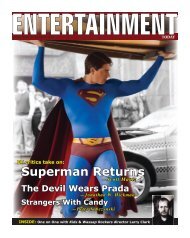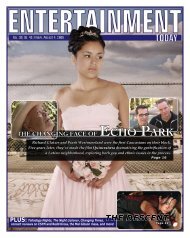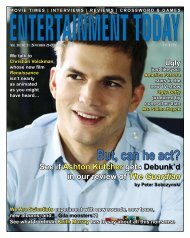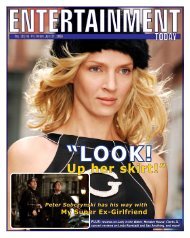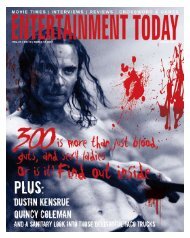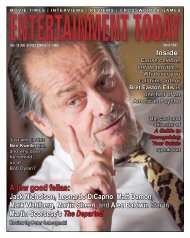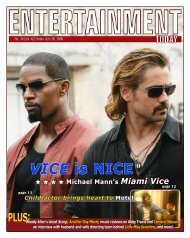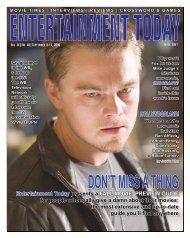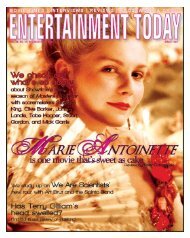LOVE
this issue of Entertainment Today
this issue of Entertainment Today
You also want an ePaper? Increase the reach of your titles
YUMPU automatically turns print PDFs into web optimized ePapers that Google loves.
y Peter Sobczynski<br />
The shroud of secrecy covering<br />
the organization known as the<br />
MPAA has been lifted thanks to the<br />
startling new film This Film Is Not Yet<br />
Rated from provocative filmmaker<br />
Kirby Dick. In the film, Dick exposes<br />
the hypocrisy, homophobia, and<br />
blatant favoritism of the supposedly<br />
“unbiased” Ratings Board in a variety<br />
of ways. He interviews a diverse<br />
coterie of filmmakers—John Waters,<br />
Kimberly Pierce, Mary Harron,<br />
Jamie Babbit, Kevin Smith, Atom<br />
Egoyan, and Matt Stone—who tell<br />
their horror stories of what transpired<br />
when their work was slapped with the<br />
dreaded “NC-17.”<br />
Not Yet Rated deftly provides<br />
side-by-side comparisons of scenes<br />
from indie films that were given the<br />
“NC-17” (“No Children Under 17”)<br />
in its utilization of obviously comparable<br />
clips from studio films that<br />
received an “R.” Most, if not all, of<br />
the comparisons made are staggering<br />
in their revealing a blatant bias on the<br />
part of the Board.<br />
Dick hires a private detective<br />
to track down who the needlessly<br />
(and possibly unconstitutionally)<br />
anonymous members of the Ratings<br />
Board are in order to see if they actually<br />
match the MPAA’s description of<br />
their being ordinary parents of young<br />
children with no ties to the industry.<br />
(Guess what? Most of ‘em hardly<br />
meet these “qualifications”!)<br />
In his nerviest point of attack,<br />
Dick submits this very film to the<br />
MPAA’s Ratings Board in order to<br />
get a first-hand look at the process.<br />
I sat down recently with Dick to<br />
talk about his film, the dangers of<br />
an increasingly consolidated media,<br />
the inequities of the current rating<br />
system, and what, if anything, he feels<br />
can be done to change its gross fallacies<br />
in a way that gives all filmmakers<br />
an equal playing field.<br />
Peter Sobczynski: When did you<br />
first become interested in the MPAA<br />
and their policies toward the classification<br />
of feature films?<br />
Kirby Dick: It was something that<br />
I have been interested in for a long<br />
time. I had been looking at the notes<br />
I had taken for over a decade, and<br />
tried to figure out what kind of film<br />
I could make out of it. Once my<br />
producer and I hit upon this idea of<br />
hiring a private investigator, that was<br />
when I could finally see it as a film,<br />
because I now had a dramatic arc.<br />
PS: Considering that nearly every<br />
one of the top independent distributors<br />
are now owned by the major<br />
studios—and are therefore signatories<br />
to the MPAA, how difficult was it to<br />
find financing and distribution for<br />
This Film Is Not Yet Rated?<br />
KD: I actually went to a number of<br />
companies who wanted to work with<br />
me but couldn’t because they were<br />
owned by MPAA companies. For a<br />
while, I thought it was never going to<br />
get made, and it wasn’t until I went to<br />
IFC—which isn’t an MPAA-related<br />
company because they are owned<br />
by CableVision. This is one of the<br />
themes of the film: media consolidation.<br />
These MPAA companies own<br />
95% of the film business, and their<br />
corporate parents own 90% of all<br />
media. This is why you are seeing<br />
a lot of critique about the Media<br />
being stifled today. If IFC had been<br />
owned by a studio, I don’t think that<br />
this film would have been made. Or,<br />
if it had, it would have been made by<br />
credit card.<br />
PS: In terms of the interviews, did<br />
you have trouble getting filmmakers<br />
who had tussled in the past with the<br />
MPAA to speak on camera lest their<br />
speaking out might come back to<br />
haunt them the next time one of their<br />
films goes before the Board?<br />
KD: Yeah, there was a lot of that. I<br />
was really surprised of the paranoia<br />
that surrounded the idea of people<br />
speaking out about the ratings system.<br />
They were really afraid that their<br />
future movies would be rated more<br />
harshly. A few were even afraid of<br />
being branded as troublemakers in<br />
Hollywood. I think there is a real<br />
fear of how the Ratings Board will<br />
treat future films, and it is a legitimate<br />
fear that the MPAA does nothing to<br />
dispel. It works in their favor: This<br />
fear silences the very people who<br />
have had their films impacted by this<br />
Courtesy of IFC<br />
system so that it limits any criticism<br />
of that entire process.<br />
PS: Why is it that America is unable<br />
to have a workable rating system that<br />
allows for adult material without the<br />
social and economic stigma carried by<br />
the “NC-17,” a rating that automatically<br />
means that a film that bears it<br />
cannot be shown in many theaters,<br />
advertised in most newspapers or on<br />
television, and won’t be carried at big<br />
chain video stores?<br />
KD: The reason it has happened<br />
like that in this country is because<br />
the film industry is a more powerful<br />
industry in this country than<br />
virtually anywhere else in the world.<br />
They have the power to gain control<br />
of the rating system, and once they<br />
gain control of it, it becomes an<br />
asset, and they are going to use it to<br />
increase their bottom line, which is<br />
their mandate. They do this in any<br />
number of ways. One way that they<br />
do it is by releasing films that tend to<br />
have more violence in them because<br />
they have a rating system that gives<br />
those types of films less restrictive<br />
ratings so that they get out to a wider<br />
audience. The films that have more<br />
adult sexuality tend to be made by<br />
the competition—independent and<br />
foreign filmmakers—and it doesn’t<br />
hurt the majors to give those films an<br />
“NC-17” rating. In fact, even though<br />
this competition is comparatively<br />
small, it actually helps the majors.<br />
PS: The battles that you cite in the<br />
film focus exclusively on films with<br />
sexually-oriented material. Why did<br />
you decide to limit the focus of the<br />
film in this way?<br />
KD: That is a good question. This<br />
was a very complex film for me to<br />
structure because I was dealing with<br />
multiple threads. I had the inter<br />
see KIRBY DICK on p.26<br />
|23|<br />
THE U.S. VS.<br />
JOHN LENNON<br />
(3 out of 4 stars)<br />
Directed by David Leaf,<br />
John Scheinfeld<br />
99 minutes, Not Rated<br />
by Warren Curry<br />
I was eight years old when<br />
John Lennon died. Though I don’t<br />
recall exactly where I was when<br />
I first heard about the tragedy,<br />
I do remember the News being<br />
dominated by his death for several<br />
days. I would soon learn that he<br />
was a member of the Beatles, the<br />
most popular rock band of all time.<br />
As I grew older, I also discovered<br />
that Lennon used his music and<br />
his fame as a vehicle to express<br />
very outspoken political views, and<br />
thus became a lightning rod for<br />
controversy.<br />
David Leaf and John Scheinfeld’s<br />
documentary The U.S. vs. John<br />
Lennon concentrates on a ten year<br />
period from 1966-1976 when Lennon<br />
completed his evolution from a<br />
harmless “Moptop” pop musician to<br />
a political activist whose immense<br />
popularity struck fear in the US<br />
government’s highest powers. It’s<br />
an engaging film only slightly hampered<br />
by a perspective so reverential<br />
that it nearly amounts to a grand<br />
exercise in hero worship. Aiding<br />
the film is a wealth of never before<br />
seen archival footage—courtesy of<br />
Lennon’s wife Yoko Ono—and a<br />
host of present-day interviews conducted<br />
with many figures integral<br />
to the tale. Leaf and Scheinfeld<br />
crisply piece the elements together<br />
to tell a seamless<br />
story about<br />
both an admirably<br />
strongwilled<br />
person<br />
and one of the<br />
most volatile<br />
eras in recent<br />
American<br />
history.<br />
Even prior<br />
to his increasing<br />
visibility<br />
as an activist,<br />
Lennon was no<br />
stranger to ruffling<br />
feathers.<br />
His comment that the Beatles were<br />
more popular than Jesus caused an<br />
uproar in the United States that<br />
sparked a profound public outcry<br />
by religious groups who burned<br />
Beatles records and called for an<br />
all-out boycott of the band’s music.<br />
Yoko Ono and John Lennon make their mark.<br />
Lennon’s socio-political awareness<br />
grew when he entered into<br />
a relationship with Yoko Ono—a<br />
Japanese performance artist living<br />
in New York—and he became<br />
louder in his disapproval of US<br />
involvement in the Vietnam War.<br />
In 1971, a year after the demise<br />
of the Beatles, Lennon and Oko<br />
played at a benefit concert for<br />
John Sinclair, the chairman of the<br />
White Panther group, who had<br />
been jailed for selling marijuana<br />
to an undercover police officer.<br />
This event, for better and worse,<br />
established Lennon as the most<br />
famous member of the American<br />
counterculture.<br />
Lennon’s newfound status made<br />
him a deity in some eyes, but the<br />
US government quickly perceived<br />
him as an enemy. Now keeping<br />
company with the likes of wellknown<br />
radicals Abbie Hoffman,<br />
Jerry Rubin, and Black Panther cofounder<br />
Bobby Seale—all the while<br />
planning a nationwide tour with<br />
the purpose of galvanizing young<br />
Americans to vote Richard Nixon<br />
out of office—Lennon became<br />
another victim of the FBI’s personal<br />
terrorism led by J. Edgar Hoover.<br />
The situation came to a head when<br />
Senator Strom Thurmond wrote<br />
a secret letter to Nixon’s attorney<br />
general, John Mitchell, that urged<br />
for Lennon’s deportation. The<br />
singer would spend the next five<br />
years fighting for the right to stay<br />
in the United States.<br />
Leaf and Scheinfeld make no<br />
bones about which side of the<br />
ideological fence they stand on, and<br />
as such, their fervently pro-Lennon<br />
viewpoint<br />
omits information<br />
that could<br />
have made for a<br />
more intriguing<br />
documentary.<br />
In addition<br />
to allowing<br />
the filmmakers<br />
access to<br />
her archives,<br />
Yoko Ono is<br />
also a prominent<br />
interview<br />
subject. It<br />
would’ve been<br />
fascinating<br />
to learn more<br />
about Lennon’s internal strife that<br />
even caused the couple to split-up<br />
for well over a year. About the<br />
only dissenting voice heard in<br />
the interviews is former Nixon<br />
see LENON on p.27<br />
SEPTEMBER 15-21, 2006 ENTERTAINMENT TODAY<br />
Courtesy of Getty Images



